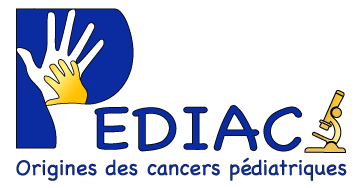research team celio pouponnot
Pediatric cerebral tumors
Celio Pouponnot leads the team “Signaling in Cancer progression” in Institut Curie (IC, Orsay) which is part of the unit “Signaling, Radiobiology and Cancer ” IC/ U1021 Inserm /UMR3347 CNRS/ PSaclay.
The team focuses its current work on pediatric brain tumors, mainly medulloblastoma (MB) a pediatric tumor of the cerebellum, but also, thanks to collaborations, on other CNS (central nervous system) pediatric tumors
including AT/RT (Collaboration F. Bourdeaut) and retinoblastoma (F. Radvanyi). The team have a long-lasting expertise in the signaling field in cancer. CP has performed his post-doctoral
training on the TGFβ/BMP signaling pathway in J. Massagué’s lab, a world leader in the field. This expertise in signaling
will benefit to study the ligands/receptors interactions (WP2) and in particular to WP2. 2 (BMP signaling). The team have developed strong skills, particularly in signaling and animal models that has been shared through diverse collaborations
(Cerezo et al., Nat Med 2018; Forget et al., Cancer Cell 2018; Mahe et al., EMBO Mol Med, 2018; Niceta et al., Am J Hum Genet 2015; Pegaro et al., Nat comm 2015, Arnault et al., Clin Cancer Res 2012). The team worked for several
decades on two oncogenic families: the RAF Ser/Thr kinases (Peyssonnaux and Eychene, Biol Cell 2001) and the MAF transcription factors (TF) (Eychene et al., 2008 Nat Rev Cancer).
These studies have progressively led the team to focus on two main pathologies, melanoma and medulloblastoma (MB). The team uses and develops different types of cancer models, in vitro with established
cell lines as well primary cell cultures and, in vivo, such as complex inducible GEMM (genetically engineered mouse model) with more than 6 modified loci and 9 different alleles, subcutaneous grafting or brain transplantation of
human tumors (PDX-PDOX), mouse primary tumors from GEMM, modified transformed primary progenitors and cell lines (CDX). Tumor growth can be followed by different means including bioluminescence quantification (IVIS). The team uses
immunodeficient or immunocompetent mice (syngeneic grafting).
Recently, the team focuses, almost exclusively, its projects on pediatric brain tumors, mainly medulloblastoma. This expertise in signaling/animal models /pediatric tumors is well
exemplified by the last publication from the team (Morabito et al., EMBO Mol Med 2019) which deciphers the role of the TGFβ/Activin
pathway in MB and demonstrates the high therapeutic potential of its targeting by specific kinase inhibitors. Celio Pouponnot’s team have also demonstrated that a subtype of medulloblastoma named Group 3 is addicted to an abnormal
identity unrelated to the tissue of origin, the cerebellum. This showed a strong dependency on two retina lineage restricted TFs (Garancher et al., Cancer Cell 2018) that establish this abnormal retinal identity. The current work
aims at understanding the biology of high-risk MB and the failure to radiotherapy. In this context, the team implemented an in vivo G3 MB model that will be suitable to set-up the conditions for an in vivo screen on primary progenitors
(WP3).
If successful, this expertise in in vivo screen on primary cells will benefit to all the members of the consortium and shared with the pediatric research community. In the context of WP3, the team have started to nucleate a group
on organoids and tumoroids within the consortium to share experience and skills. B. Duvillie in the team participates actively to this group. The team also develops projects on radiotherapy using
different animal models. One of this model is part of WP2 (O. Ayrault, T. Mercher, JY Blay). WP2 will benefit from analysis performed on this experimental model as well as on published scRNAseq and RNAseq datasets. In this context,
the team has implemented different FACS antibody panels to study the stromal components. This panel is central in WP2, all teams involved will benefit from this expertise.
